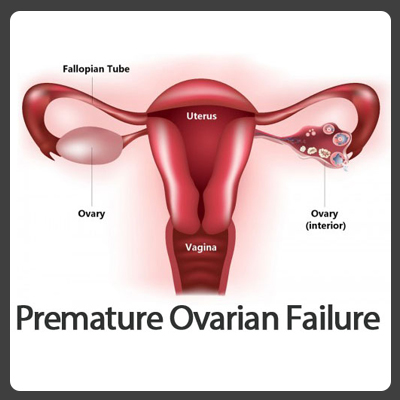Primary ovarian insufficiency also called premature ovarian failure occurs when the ovaries stop functioning normally before age 40. When this happens, our ovaries do not produce normal amounts of the hormone estrogen or release eggs regularly. This condition often leads to infertility.
Primary ovarian insufficiency is sometimes confused with premature menopause, but these conditions are not the same. Women with primary ovarian insufficiency can have irregular or occasional periods for years and might even get pregnant. But women with premature menopause stop having periods and can not become pregnant.
Restoring estrogen levels in women with primary ovarian insufficiency helps prevent some complications that occur as a result of low estrogen, such as osteoporosis.
SYMPTOMS OF PREMATURE OVATIAN FAILURE
Signs and symptoms of primary ovarian insufficiency are similar to those of menopause or estrogen deficiency. They include:
- Irregular or skipped periods, which might be present for years or develop after a pregnancy or after stopping birth control pills
- Difficulty getting pregnant
- Hot flashes
- Night sweats
- Vaginal dryness
- Dry eyes
- Irritability or difficulty concentrating
- Decreased sexual desire
CAUSES OF PREMATURE OVATIAN FAILURE
Primary ovarian insufficiency may be caused by:
- Chromosomal defects -Some genetic disorders are associated with primary ovarian insufficiency. These include mosaic Turner syndrome in which a woman has only one normal X chromosome and an altered second X chromosome and fragile X syndrome in which the X chromosomes are fragile and break.
- Toxins- Chemotherapy and radiation therapy are common causes of toxin-induced ovarian failure. These therapies can damage genetic material in cells. Other toxins such as cigarette smoke, chemicals, pesticides and viruses might hasten ovarian failure.
- An immune system response to ovarian tissue (autoimmune disease)-In this rare form, our immune system produces antibodies against our ovarian tissue, harming the egg-containing follicles and damaging the egg. What triggers the immune response is unclear, but exposure to a virus is one possibility.
- Unknown factors- The cause of primary ovarian insufficiency is often unknown (idiopathic).There might be recommendation of further testing to find the cause, but in many cases, the cause remains unclear.
RISK FACTORS
Factors that increase our risk of developing primary ovarian insufficiency include:
- Age-The risk goes up between ages 35 and 40. Although rare before age 30, primary ovarian insufficiency is possible in younger women and even in teens.
- Family history-Having a family history of primary ovarian insufficiency increases our risk of developing this disorder.
- Ovarian surgery- Surgeries involving the ovaries increase the risk of primary ovarian insufficiency.
COMPLICATIONS OF PREMATURE OVARIAN FAILURE
Complications of primary ovarian insufficiency include:
- Infertility- Inability to get pregnant can be a complication of primary ovarian insufficiency. In rare cases, pregnancy is possible until the eggs are depleted.
- Osteoporosis- The hormone estrogen helps maintain strong bones. Women with low levels of estrogen have an increased risk of developing weak and brittle bones (osteoporosis), which are more likely to break than healthy bones.
- Depression or anxiety- The risk of infertility and other complications arising from low estrogen levels causes some women to become depressed or anxious.
- Heart disease- Early loss of estrogen might increase our risk.
HOMOEOPATHIC TREATMENT FOR PREMATURE OVARIAN FAILURE
Homeopathy is a holistic systems of medicine in which the selection of remedy is based upon the theory of individualization and symptoms similarity by using holistic approach.This is the only way through which a state of complete health can be regained by removing all the sign and symptoms from which the patient is suffering. Premature ovarian failure treatment that can be selected on the basis of cause, location, sensation, modalities and extension of the complaints.
The homoeopathic medicine AGNUS CASTUS is known to act on the hypothalamic-pituitary –ovarian axis correcting and regulating the entire reproductive system.


